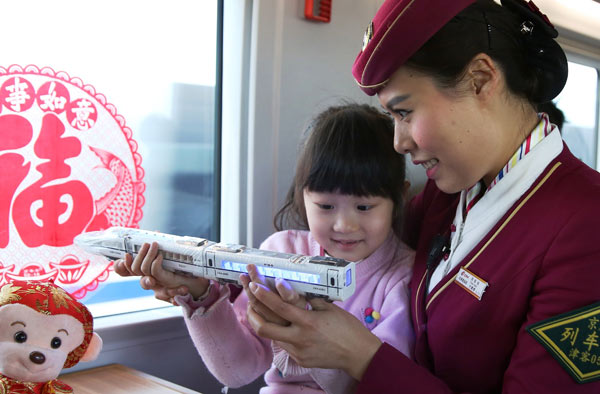 |
|
A high-speed train attendant serves a passenger. China's high-speed railway has seen an average annual growth of over 30 percent in passenger trips since 2008. Qiao Qiming / For China Daily |
There have been more than 5 billion passenger trips on China's world-renowned bullet trains in eight years, according to new data from the national rail operator. Since its debut in 2008, China's high-speed railway has seen an average annual growth of over 30 percent in passenger trips, the China Railway Corporation said on Thursday, the day after China announced plans to double its length of HSR by 2025.
In 2015 alone, over 1.1 billion trips were made on bullet trains in China, representing more than 45 percent of the country's total railway passenger delivery.
For a nation as large and populous as China, the HSR is charged with overcoming the "bottleneck" in the development of the railway, which is vital for mass transportation, said transportation expert Gu Zhongyuan.?
Some 4,200 bullet trains operate on the HSR every day, facilitating over 4 million passenger trips, according to an employee with the official train ticketing website 12306.com.
One of the countless people to benefit is Wang Liya, a mother of two who lives in Guiyang, southwest China's Guizhou province, which used to be a 21-hour train trip away from her husband and the children's father's workplace of Guangzhou in south China's Guangdong province.
"It's now much more convenient to visit their dad," said Wang of a high-speed train service launched in late 2014 that cut the journey down to only four hours, enabling far more frequent family reunions.
There are many other reasons behind the stellar growth in passenger trips besides the speed, including accessibility, safety and punctuality, all of which have enabled the CRC to find more and more customers worldwide.
China's 19,000 km of high-speed track represents 60 percent of the world's total. It is part of a domestic network of more than 120,000 km of track, which now connect almost all the provincial capital cities and cities with over 500,000 residents.
"China is the world's largest HSR builder and operator, the best all-rounder in technical know-how and the most experienced manager," said Sun Zhang, a professor at Shanghai's Tongji University.
In July, the National Development and Reform Commission said that China would aim to have 38,000 km of HSR by 2025.
By 2020, one-fifth of the country's 150,000-km railway network will be HSR, connecting over 80 percent of major cities nationwide, said the NDRC.
The race to build is being done with no compromise in terms of safety. China's rail network, on which the world's largest fleet of bullet trains operates, has the world's best safety record, according to data compiled by the International Union of Railways and the European Railway Agency.
Besides, Chinese high-speed trains score high in punctuality - 98.8 percent for departure and 95.4 percent for arrival at the final destination in 2015.
"Bullet trains are enabling the Chinese people to significantly expand their circle of life and travel, which is changing their lifestyle," said Shi Peihua, a professor at Beijing Jiaotong University.
The construction and operation of high-speed railways is also driving industries including metallurgy, machinery and electricity.
"The high-speed railway is a powerful engine propelling China's economic and social development," Sun said.
